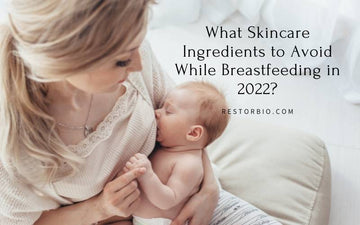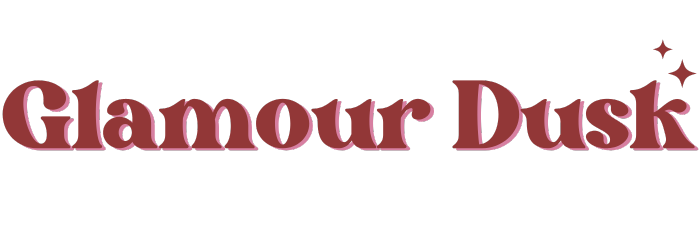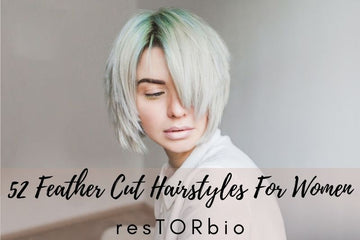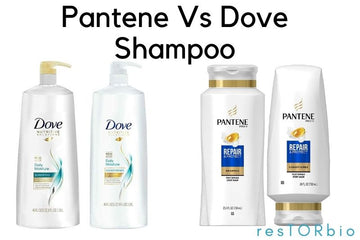
While every woman has her own opinions on which skincare ingredients are best to use while breastfeeding, one particular component has become more and more of a known threat.
Check out our full ingredients breakdown for popular products here.
Not only can products with this ingredient put your child at risk, but the possibility is high that you will pass along the danger. Keep reading this article; resTORbio will show you What Skincare Ingredients to Avoid While Breastfeeding.
Why Skincare Ingredients matter to breastfeeding?
You may have been like me and thought about the first time you drank iced coffee or wine while you were still recovering after labor and delivery.

It can be challenging to give up the things you love after nine months.
You are entitled to a treat after giving birth to a baby, but you need to be extra careful about what you put on your body.
Therefore, why not use retinol ingredients while you breastfeed?
Your doctor may have already told you that breastmilk can transmit any food or skin products to your baby.
You should eat a healthy diet high in vitamins and minerals, and avoid smoking, drinking, and using drugs.
Although chemicals in skincare products may not be all harmful, they can enter the bloodstream and breast milk.
This can lead to allergies and congenital disabilities in extreme cases.
Body lotions or perfumes you are wearing can cause skin-to-skin contact and irritation.
Avoid potential problems by always reading the label.
Ask your doctor if you are still unsure about the specific ingredients. Or find another product.
Nursing Benefits
- You can burn extra calories without even stepping on a treadmill!
- Protect your baby from illness, including ear infections, asthma and diarrhea, as well as lower their chances of developing type 2 diabetes, sudden infant death syndrome (SIDS), leukemia, and obesity during childhood
- They are conveniently packaged, so you can take them wherever you go.
- Oxytocin is a hormone that aids breastmilk flow and enhances feelings of love, nurture, and an emotional bond.
- It saves time. You don't need to mix formula, heat bottles, sterilize Naples, etc.
- As your baby gets older, it will meet their specific needs.
- Your risk of developing type 2 diabetes, some types of breast cancer and ovarian cancer is lower.
- It is always at the right temperature.
- It is suitable for the environment. It is a renewable resource like bamboo fiber that doesn't require you to throw away anything
Skincare Ingredients to Avoid While Breastfeeding

Retinoids
This skincare ingredient is derived from topical vitamin A.
It is well-known for its anti-aging benefits and anti-acne properties.
It is something I recommend once pregnancy and nursing are finished, it can cause congenital disabilities.
It would help if you were cautious about getting Retinoids.
It can be used in conjunction with beauty products that are otherwise considered safe.
Many exfoliants/scrubs that are glycolic acid have retinoids added.
These names should be on product packaging.
- Retinol
- Retinoic acid
- Differin (adapalene)
- Retin-A, Renova (tretinoin)
- Retinyl Linoleate
- Retinyl palmitate
- Tazorac (tazarotene), Avage (tazorac)
Parabens
Parabens are used as a preservative in personal beauty products such as shampoos, conditioners, and body washes.
Parabens can be absorbed into the skin cells in trace amounts, regardless of whether you or your baby use them.
Parabens can cause allergic reactions in babies.
It can cause severe damage to their endocrine systems.
Parabens are controversial and still under investigation. I decided to make my skincare line paraben-free.
Parabens are easily located because they are usually listed in the ingredient's title.
These are just a few examples.
- Propylparaben
- Ethylparaben
- Butylparaben
- Isopropyl
- Isobutyl
- Methylparaben

Chemical sunscreens
The sunscreens' active ingredients absorb UVA and UVB rays from the sun, breaking down and releasing heat.
Check out sunscreens safe for pregnancy.
This will protect you from sunburn and sun damage.
It would help if you always used sunscreen with at least SPF 30+ daily, but you can also apply a mineral sunscreen while nursing mom.
These are placed on top of your skin to block the harmful rays.
I would choose a formula with titanium dioxide or zinc oxide.
The use of sunscreens can cause allergic breastfeeding mother hormone production.
They have also been found in breastmilk.
These main ingredients are used in chemical sunscreens.
- Oxybenzone
- Octinoxate
- Avobenzone
- Octisalate
- Homosalate
Acne Products
Even if your problematic skin has been evident since your teens, you could still get pimples when your baby grows.
It's a good idea to consult a board-certified dermatologist before you start using any over-the-counter acne products.

Avoid Salicyclic acid in Peels and Masks
Salicyclic acid can be found in exfoliants and creams for acne.
It's commonly used in skin toners and cleansers. It penetrates the skin's pores. The ingredient is also available as an oral solution.
This should be avoided. While breastfeeding babies can use the component in light, simple applications, it is more harmful than the body and facial peels. It is left on the skin for longer times and in higher concentrations.
Makeup
Although not all cosmetics are dangerous for babies, some should be avoided.
Now, products marked as"non-acnegenic", "non-comedogenic," or mineral-only makeup products are generally safe to use when breastfeeding as these don't clog pores and are oil-free.

Ingredients to Include in Your Breastfeeding Safe Skincare Routine
- Vitamin C
- Vitamin E
- Glycerin
- Squalane
What are Safe Skin Care Products During Breastfeeding? Hydration is crucial. Dr. Karp states that breastfeeding requires you to keep your skin moisturized and protected from the sunlight.
Look for products that contain vitamin C and E. Vitamin C is known to reduce hyperpigmentation which is common during pregnancy due to hormones.
Bio-Oil Skincare Oil Natural is my favorite because it doesn't have a fragrance or antioxidants. It also improves the appearance of stretch marks for pregnant women.
Debra Jaliman M.D. is a board-certified dermatologist who stresses the importance of maintaining skin moisturized to decrease stretch marks while nursing. She says that squalane, shea butter, and glycerin are good moisturizing ingredients for breastfeeding.
Use gentle, fragrance-free cleansers like the La Roche Posay Toleriane Hydrating Gent Face Cleanser.
Dr. Karp recommends mineral-based sunscreens containing zinc oxide and titanium dioxide to protect our skin from sunburns.
Dr. Jaliman recommends Cerave SPF50 Sunscreen for all skin types. She explains that the Cerave SPF 50 Sunscreen will prevent age spots from developing and help with acne inflammation.
Dr. Jaliman also recommends EltaMD UV Clear Broad-Spectrum Sunscreen 46. She explains that it is lightweight, oil-free and fragrance-free, and suitable for people with acne-prone skin.
Is lactic acid safe while breastfeeding? It will moisturize your skin. The lactic acid will help to reduce shine and clear pores.
Safe Skincare Regimen
1. Hydrate with water. Although this may seem like a lot, it is essential to hydrate the skin for pregnant women. You should aim for 8-10 cups per day.
2. Protect the skin's barrier. It is recommended to use sunscreen with an SPF 30 or higher.
This helps protect the skin's barrier and reduces the appearance of dark spots, fine lines, and oily skin. If you are allergic to chemical sunscreens, look for zinc oxide sunscreen.
3. Avoid contacting the baby's skin. While you can use Vitamin C, Vitamin A, collagen-boosting ingredients and exfoliating acid in your skin care routine, avoid the neck or chest area where your baby might snuggle or feed.
Look at the labels of skincare products for names like lactic acid, glycolic acid, BHA (beta-hydroxy acid), AHA (alpha-hydroxy acids) and BHA (beta-hydroxy acid), hyaluronic acid. Avoid ingredients such as parabens, formaldehyde, and essential oils, which can irritate.
4. Get your fruits and veggies! Take vitamins and antioxidants from your food. Pregnant and breastfeeding mothers also get many benefits.
5. Use gentle cleansers, moisturizers, and soaps. It is essential to make contact with your baby skin-to-skin.
It is not unusual to need to treat skin problems, no matter how new you are. Before choosing skincare products, make sure to consult a dermatologist. Also, inform them if you are a pregnant and breastfeeding mother, nursing, or pumping.
They will be able to use their knowledge, experience, and database to discuss the safety, efficacy, and use of skin care products based on evidence-based studies.
Other Tips and Tricks for Breast Feeding
There are many ways to take care of your skin while pregnant and breastfeeding your baby, apart from using specific skin care products and ingredients.

These should be simple to remember. I'm sure that you've heard them before having your baby!
1. Use non-comedogenic, fragrance-free formulas. This will reduce the chance of your little nugget getting an allergic reaction.
You can also use baby-specific skincare products if you are extra cautious. You will reduce the likelihood of irritating skin being touched by something you use.
2. Get plenty of water. Hydration has a plumping and hydrating effect on the skin. Dehydrated skin can make it look duller and more visible.
Fatigue can also be caused by dehydration. A great way to remind yourself to drink enough water is to bring a water bottle.
3. Take care of your skin. A well-balanced diet will help you maintain your energy, keep your hunger under control, and improve the quality of your breastmilk.
You don't need to be bland to be healthy! Berries are one way to get antioxidants that protect your skin from being damaged by free radicals.
4. Do not abandon your skincare routine. I get it! Babies need constant attention and care. Your skin is the last thing that you should be concerned about.
A skincare routine can prevent problems from happening and help maintain skin health. Preventive measures are better than curative. It is possible to spend more time fixing a problem than in the first instance.
5. Ask for help. It can be challenging to have a baby if you don't know it. It takes a village, as the old saying goes. But you don't have it all to yourself.
It's okay to ask for help. This does not mean that you are a bad mom, and you should not feel guilty. You can ask your family and friends to babysit or cook for you. You can do errands or shower, or take a break. This leads me to my next tip.
6. When you can, rest. It's impossible to get to sleep when your baby is sleeping, so try to sneak in some sleep! NASA found that astronauts and military pilots who slept for 40 minutes saw a 34% improvement in performance and were alert when they woke up.
You can always meditate, lay down, and listen to soothing music if you are concerned that napping might disrupt your nighttime sleep routine.
With all of this information, you might feel overwhelmed.
You don't have to worry!
Continue scrolling to find safe and effective products that you can use while nursing.
What Skincare Ingredients to Avoid While Breastfeeding: Conclusion
Many skin care ingredients can be harmful to both mother and baby while breastfeeding. Some elements to avoid include retinoids, benzoyl peroxide, salicylic acid, and alpha-hydroxy acids. We hope that our article can help you learn more ways to protect your babe.




